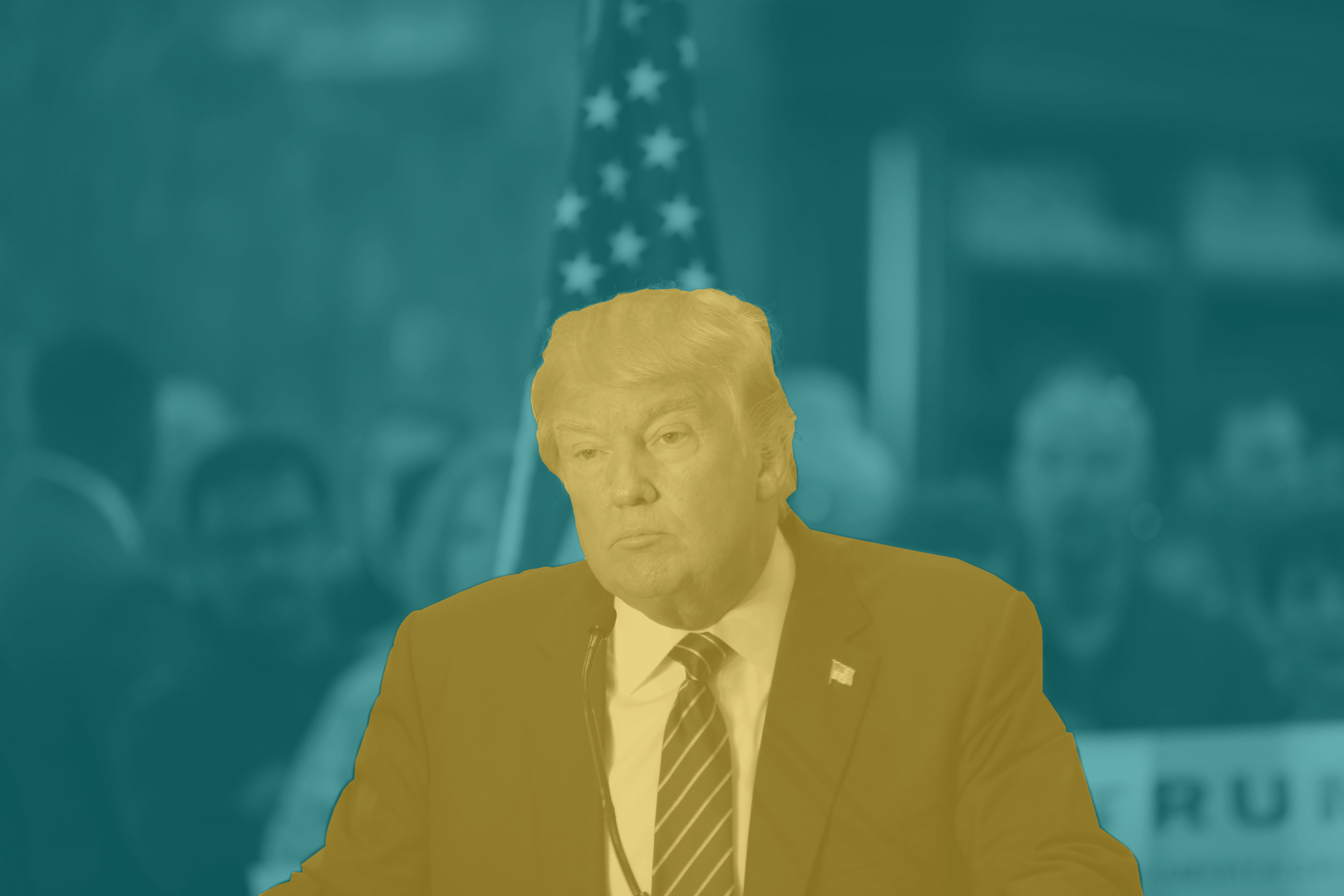The State of Science: What Might Happen Under the Trump Administration
“There’s more uncertainty than knowledge about what’s going to happen with the new administration,” said a former congressman.

President Donald Trump hasn’t spent much time publicly discussing his plans for science policy and research. Indeed, “there’s more uncertainty than knowledge about what’s going to happen with the new administration,” former congressman Rush Holt told Science Friday last week. Holt was part of a panel of science policy experts that joined Ira for a special post-inauguration show. Here are a few of the big points our guests made:
The idea of “alternative facts” isn’t new to Washington:
Kellyanne Conway, counselor to President Trump, made a stir when, during an appearance on Meet the Press on January 22nd, she referred to Press Secretary Sean Spicer’s falsehoods as “alternative facts.” Holt referred on Friday to a similar philosophy a few decades ago. Here’s how he tells it:
“I was a AAAS American Physical Society fellow. This is a program AAAS has run for many decades now to place Ph.D.-level scientists in all three branches of the government. There are about 250 such fellows every year.
“And way back then, in the early ’80s, a group of us scientists were in the orientation session for the year-long fellowship. And one of the speakers said, ‘Now, you have to understand that here in Washington, facts are negotiable.’ And then the next day, a completely separate speaker said, ‘You have to understand that here in Washington, we treat facts differently.’ And the third day, a different speaker at our orientation said, ‘You have to understand that here in Washington, perceptions are facts.’
“And I really think what we see now, you know—the really willfully fake news (not mistakenly factually wrong news, but willfully mistaken), [and] policy makers who are willfully excluding the research-based evidence from their policy making—it’s gotten worse. And so when we talk about the erosion of the appreciation of science, that’s what I mean, anyway. And it’s not new, but it’s come to a head now, almost a culmination.”
The U.S.’s commitment to the Paris Agreement is on thin ice.
When the Paris Agreement went into effect last November, nearly 200 countries made a pledge to keep global warming below 2 degrees Celsius, with a tougher target of 1.5 degrees Celsius. However, the pledge isn’t legally-binding, which means that the U.S. could change its position, according to Holt:
“Judging by the president’s appointments, his statements during the campaign and since, we should expect that he’s going to at least ignore the U.S. obligations under the Paris Agreement. And maybe seek to undo it in some sense—maybe some formal action with respect to the agreement. I would guess, most likely, he’ll just ignore it.”
And what will happen to national climate research and policy under the new administration? David Goldston, the director of government affairs at the Natural Resources Defense Council, gave his view:
“I think that it’s not clear what will happen with climate research. I think this is one of the things that people really need to watch. There have been rumors of everything from general cuts in research to eliminating NASA’s Earth Science program.
“The thing that we know that they’ll go after is climate policy. And that’s unquestioned. And there are many tools to fight back against that—those efforts. But that’s the one thing that’s certain.
“I think on climate science, it used to be that folks against climate policy used to say, Oh, well, let’s fund the research instead. Over the last five or 10 years, that’s changed to attacking the science and the science budget as well. But that’s sort of more up for grabs right now than the policy arena is.”

At its core, the Department of Energy is a science and tech agency. Its new head, Rick Perry, finally seems to be acknowledging its role:
President Trump nominated former Texas governor Rick Perry as head of the Department of Energy. During the 2012 presidential campaign, Perry infamously said he would abolish the same department. Susan Tierney, former Assistant Secretary for Policy at the U.S. Department of Energy, said that Perry probably didn’t appreciate how broad the DOE’s reach is:
“The Department of Energy is really a science and technology agency first and foremost. It’s an agency that’s involved with environmental cleanup. And it’s an agency that has been pushing a variety of technologies and basic research to make sure that America really is leading on a number of different dimensions. Energy just covers the whole gamut of the economy. And I just don’t think that Governor Perry probably appreciated that.”
But there is room for optimism, Tierney says:
“In fact, he said during his confirmation hearing that he learned a lot in the last few weeks, and that he’s going to champion all of the science and all of the technology research. Senators were on the point of focusing on the science mission of the agency, and getting commitments from Gov. Perry to make sure that he was going to protect scientists, protect science, protect the national laboratories and their mission. He kept saying that’s what his job will be. That’s good news.”
Despite the president’s campaign promises, bringing back coal doesn’t make economic sense in light of the demand for natural gas and renewable energy:
During his presidential campaign, one of the big promises President Trump made was to increase coal production and protect coal workers’ jobs. Tierney said the move would be counterintuitive, given energy trends:
“If you look at what’s happening in the markets and states whose legislatures really love renewable energy, I think it’s going to be really hard to stem the tide of interest that’s pushing for a much cleaner portfolio of energy resources.
“One of the promises of this administration, for example, is that they would bring back coal—but that’s almost unimaginable how that could happen, given that this administration will also be supporting natural gas. And the low prices of natural gas are really squeezing coal out of the marketplace.
“And renewable energy is the fuel of choice in so many parts of the country. Customers are stepping up and signing long-term contracts. A lot of the big, high-tech companies that want to control their prices as well as their carbon footprints are signing up for renewables. You look at solar panels all over the place.
“The only thing I could imagine that would be just awful would be if the Trump administration imposed import tariffs on solar panels. That would be a really bad sign.”
Science matters, and the science adviser should play an interdepartmental role:
One of the positions that Trump hasn’t filled is science adviser to the president. As Holt said, this appointment will affect multiple government agencies:
“Immediately after the election, a number of us at AAAS and other science societies urged the president to appoint a good science adviser. And I’ve tried to make the point that it’s for his sake, not for our sake, that he should have this person there.
“There will be crises. Probably next month. And who knows where, whether it’s an oil well blowout or an emerging disease. You don’t want to get up to speed then. You want somebody at the table with the national security adviser, with the domestic policy adviser, who can tell you what is known about this subject or that subject, who can bring in the expertise, who is comfortable working with other scientists. That’s really necessary.
“But what is equally necessary is that we have people who are comfortable with science distributed through all of the departments. I sent a letter to every cabinet officer nominee saying, Do you know that you head up a science agency?
“Yes, the attorney general. Yes, the Department of Housing and Urban Development. Yes, the Department of State. They need to have science people around them because crises and ongoing issues have science matters embedded in them.”
These quotes have been lightly edited for clarity. For a full transcript, click here and scroll down to “transcript.”
Dee Peterschmidt is a producer, host of the podcast Universe of Art, and composes music for Science Friday’s podcasts. Their D&D character is a clumsy bard named Chip Chap Chopman.
Julie Leibach is a freelance science journalist and the former managing editor of online content for Science Friday.